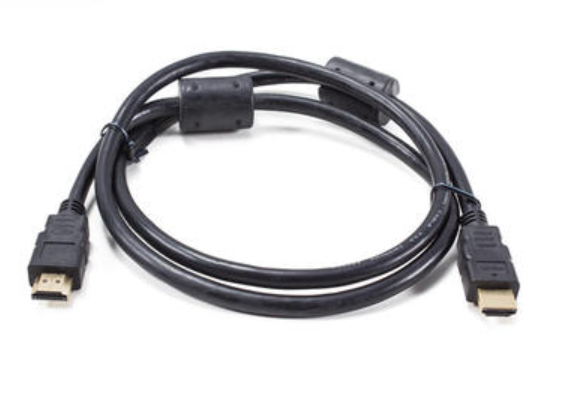
What is an HDMI Cord Used for?
HDMI cord is the lifeline of modern entertainment, connecting your devices to stunning displays, immersive sound systems, and gaming consoles. From jaw-dropping movies to heart-pounding gaming sessions, the HDMI cord effortlessly delivers it all. In this post, the author would give a full introduction to the HDMI cord.
What is the Standard of HDMI Cord?
HDMI cords come in different standards, each denoted by a number. The current standard is HDMI 2.1, which offers the highest bandwidth and supports advanced features like 8K resolution, dynamic HDR, variable refresh rate (VRR), and enhanced audio return channel (eARC).
This standard ensures optimal performance for the latest devices and provides a future-proof solution for home entertainment systems. However, it's essential to note that older devices may not fully support all the features of HDMI 2.1.
This standard ensures optimal performance for the latest devices and provides a future-proof solution for home entertainment systems. However, it's essential to note that older devices may not fully support all the features of HDMI 2.1.
What is an HDMI Cord Used for?
HDMI cords are primarily used to transmit high-definition audio and video signals between devices. They establish a direct digital connection, eliminating the need for analog conversions, resulting in superior picture and sound quality. HDMI cords are commonly used to connect devices such as:
●Televisions
HDMI cords connect TVs to a wide range of devices, including cable or satellite boxes, gaming consoles, Blu-ray players, and media streaming devices. This enables the seamless playback of high-definition content on the big screen.
●Gaming Consoles
HDMI cords are crucial for gamers, as they transmit high-quality video and audio signals from gaming consoles to TVs or computer monitors.
This ensures an immersive gaming experience with sharp visuals and synchronized sound.
This ensures an immersive gaming experience with sharp visuals and synchronized sound.
●Home Theater Systems
HDMI cords serve as the backbone of home theater setups, connecting AV receivers, speakers, projectors, and other audio/video components.
They enable the transmission of high-resolution audio formats, surround sound, and support for advanced audio technologies like Dolby Atmos and DTS:X.
They enable the transmission of high-resolution audio formats, surround sound, and support for advanced audio technologies like Dolby Atmos and DTS:X.
●Computers and Laptops
HDMI cords provide a convenient way to connect laptops or desktop computers to external displays, such as monitors or projectors. This allows users to extend their workspace or enjoy content on a larger screen.
When to Use an HDMI Cord?
HDMI cords are the go-to solution when you need to transmit high-definition audio and video signals. They are ideal for various scenarios, including:
●Home Entertainment
Whether you're watching movies, streaming TV shows, or playing games, HDMI cords ensure the best possible picture and sound quality on your television or home theater system.
●Presentations and Business Meetings
HDMI cords are widely used in corporate environments to connect laptops or projectors, facilitating seamless presentations and sharing of multimedia content.
●Professional Audio/Visual Applications
HDMI cords find extensive usage in professional settings like recording studios, video production houses, and live event venues. They allow for the transmission of high-quality video and audio signals without loss or degradation.
Are All HDMI Cords the Same?
While all HDMI cords may appear similar, there are some differences to consider. HDMI cords can be categorized into different types based on their capabilities and features, including:
●Standard HDMI
These cords support video resolutions up to 1080i and are suitable for most home entertainment setups.
●High-Speed HDMI
High-Speed HDMI cords handle higher resolutions, including 1080p, 4K, and 3D content. They are recommended for gaming, Ultra HD Blu-ray players, and other devices demanding high bandwidth.
●Premium High-Speed HDMI
Premium High-Speed HDMI cords are certified to meet stricter performance standards. They support features like 4K at 60Hz, HDR , and a wide color gamut. These cords ensure the highest quality transmission and are suitable for premium home theater setups.
Ultra High-Speed HDMI: The latest addition to the HDMI cable lineup, Ultra High-Speed HDMI cords are designed for the most demanding applications.
They support resolutions up to 8K and offer advanced features like variable refresh rate (VRR), enhanced audio return channel (eARC), and high frame rates (HFR). These cords are specifically intended for future-proofing your system and are recommended for enthusiasts and professionals.
In addition, HDMI cords have different connector types, such as standard HDMI Type A (commonly used), Type C (mini HDMI), and Type D (micro HDMI).
These connectors cater to different devices, so it's crucial to check the connector type required by your device before purchasing an HDMI cord.
Ultra High-Speed HDMI: The latest addition to the HDMI cable lineup, Ultra High-Speed HDMI cords are designed for the most demanding applications.
They support resolutions up to 8K and offer advanced features like variable refresh rate (VRR), enhanced audio return channel (eARC), and high frame rates (HFR). These cords are specifically intended for future-proofing your system and are recommended for enthusiasts and professionals.
In addition, HDMI cords have different connector types, such as standard HDMI Type A (commonly used), Type C (mini HDMI), and Type D (micro HDMI).
These connectors cater to different devices, so it's crucial to check the connector type required by your device before purchasing an HDMI cord.
Conclusion
HDMI cords have revolutionized the way we connect and enjoy audiovisual content. Understanding the standards, uses, and differences between HDMI cords is crucial for optimizing your home entertainment experience, gaming sessions, and professional setups. Remember to choose the appropriate HDMI cord based on your device's requirements, desired resolutions, and future-proofing needs.







Leave a comment